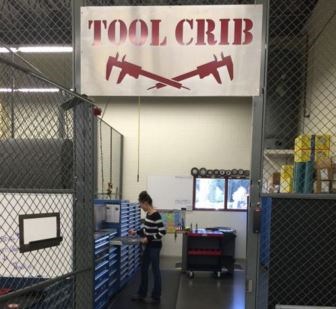Growing Great Employees
One way to address the shortage of skilled industrial labor is to hire for potential and train for productivity, capitalizing on the unique perspectives of those with experience outside of the manufacturing industry.
Share






Amanda Raney joined Whelen Engineering after working in administration at a local hospital. Less than a year later she is already in charge of managing the company’s tool crib, which is a sophisticated and critical operation. Workers with backgrounds outside of manufacturing can provide fresh and interesting perspectives.
If you take a look at the resumes of those hired by Whelen Engineering—based in Chester, Connecticut, with an additional facility in Charlestown, New Hampshire—you’ll find they come from a wide variety of backgrounds. Some were teachers, while others worked in retail or stocking shelves at supermarkets. This can be seen in a number of ways. One is that manufacturing is an attractive alternative to many types of employment, paying good wages with benefits including health care and retirement plans and allowing workers to learn valuable skills. Another is in line with the philosophy of John Olson, former president of Whelen Engineering, who says “it’s not easy to find good employees, you have to grow them.” This is evident in the training provided to all of the company’s employees, which is conducted on-site by an instructor from a local community tech center. Topics include controls, programming, writing G code and metrology. At the same time, the company believes it’s best to provide hands-on learning activities from the very beginning.
“If someone was hired to become a machine operator and has no experience with CNC machining, we’ll start them off doing basic operations as simple as loading the machine, hitting the green button, and then unloading it at the end of the cycle,” says Jeff Kochis, production machine shop manager. “We believe that it’s important for them to be comfortable with the machine and not afraid of it. That way they’ll be eager to learn more.”
Whelen is also thinking strategically, offering an “Intro to Manufacturing” course to area middle-school students to give them a taste of everything from design manufacturing and machining to working with sheet metal and injection molding. By planting this seed of an idea early, the company hopes students will consider manufacturing as a career once they’ve graduated high school. “One of the reasons we keep the shop floor so clean is that we never know when there will be a tour coming through,” Mr. Kochis says with a laugh.
Related Content
-
Addressing the Manufacturing Labor Shortage Needs to Start Here
Student-run businesses focused on technical training for the trades are taking root across the U.S. Can we — should we — leverage their regional successes into a nationwide platform?
-
In Moldmaking, Mantle Process Addresses Lead Time and Talent Pool
A new process delivered through what looks like a standard machining center promises to streamline machining of injection mold cores and cavities and even answer the declining availability of toolmakers.
-
Building Machines and Apprenticeships In-House: 5-Axis Live
Universal machines were the main draw of Grob’s 5-Axis Live — though the company’s apprenticeship and support proved equally impressive.


















.jpg;maxWidth=300;quality=90)


